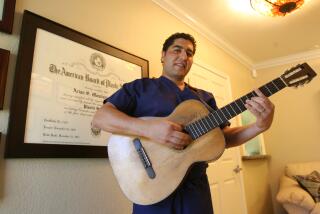Klvana Case Prompts No Reform in Medical Review
- Share via
SAN FRANCISCO — An internal inquiry into how state medical authorities handled an investigation of Dr. Milos Klvana, a Valencia obstetrician recently convicted of murder, found no need for major institutional reforms, officials said Thursday.
“Overall, I would say the system is adequate,” said Dr. Rendel Levonian after a meeting of the Medical Board of California. Levonian, a Whittier surgeon, is chairman of the board’s medical quality division.
Klvana was convicted Dec. 18 by a Los Angeles Superior Court jury of second-degree murder in the deaths of eight infants and a fetus.
An internal inquiry was prompted after Klvana’s prosecutor said the medical board failed to act against the doctor’s license, despite being aware of his incompetence.
The prosecutor, Los Angeles County Deputy Dist. Atty. Brian R. Kelberg, has called for changes in board procedures that he said rely on the opinions of physician consultants.
Kelberg said the board’s consultants frequently accepted Klvana’s version of events in an atmosphere of “collegiality” that hampered the investigation.
At Thursday’s meeting of the Division of Medical Quality, which is a seven-member arm of the board that oversees enforcement, board Executive Director Kenneth J. Wagstaff differed strongly with what he described as a public perception that “the fox is guarding the henhouse.” Board investigators--not consultants--decide whether cases should be pursued against doctors, he said.
But Kelberg, the head of the district attorney’s medico-legal section, responded in an interview that the board has “problems that have to be attacked.” The medical consultants should be replaced with people who have legal as well as medical training, he said .
Klvana was convicted because he proceeded with out-of-hospital births in cases with high-risk prenatal and childbirth complications, despite knowing that he had neither the medical skill nor the facilities in his clinics to perform them safely. The newborns died between 1982 and 1986 during birth or shortly afterward.
Klvana, 49, is scheduled to be sentenced Monday. Kelberg is seeking a sentence of 53 years to life in prison.
The most notable example Kelberg cited in his criticism of the medical board involved the 1983 death of Amanda Herrera. In that case, for which Klvana was eventually convicted of murder, two medical board consultants believed Klvana’s assertion that he did not use a labor-inducing drug outside of a hospital, according to board documents.
But an autopsy showed head injuries indicating that the infant died because she was forced through the birth canal by drug-induced contractions, Kelberg said. Board documents show that at least one of the board consultants knew of the autopsy’s existence.
One of the consultants wrote that although he believed Klvana’s care to be grossly negligent, “I would assume his practice in this case is no different from many situations in the Third World where only marginal medical care is available.”
During the board meeting, Wagstaff did not mention the Klvana case by name. But he referred to the “Third World” comment and said he plans to issue instructions to all medical board consultants about the meaning of California standards of health care.
“We don’t use Third World standards,” he told the board.
More to Read
Sign up for Essential California
The most important California stories and recommendations in your inbox every morning.
You may occasionally receive promotional content from the Los Angeles Times.









